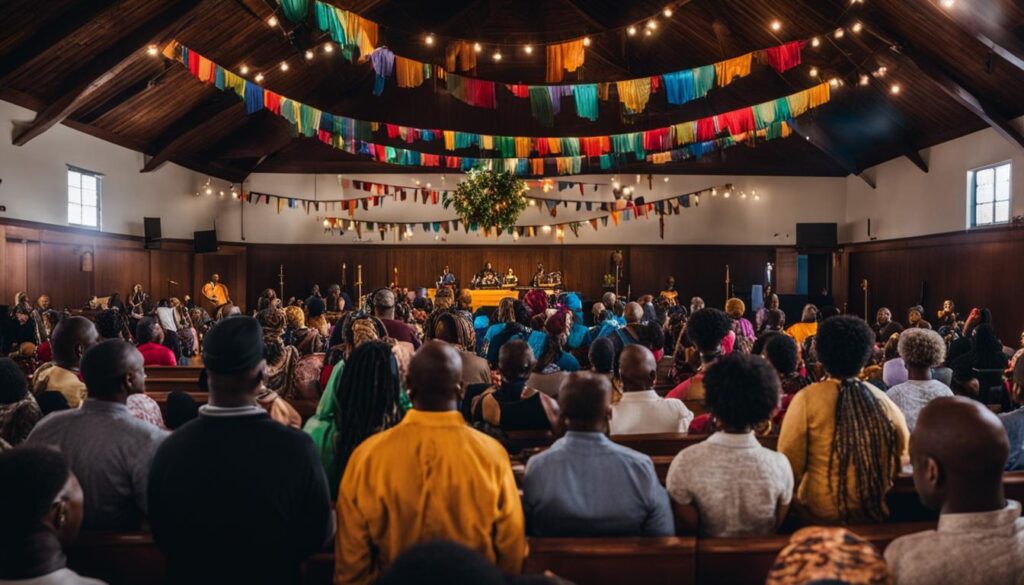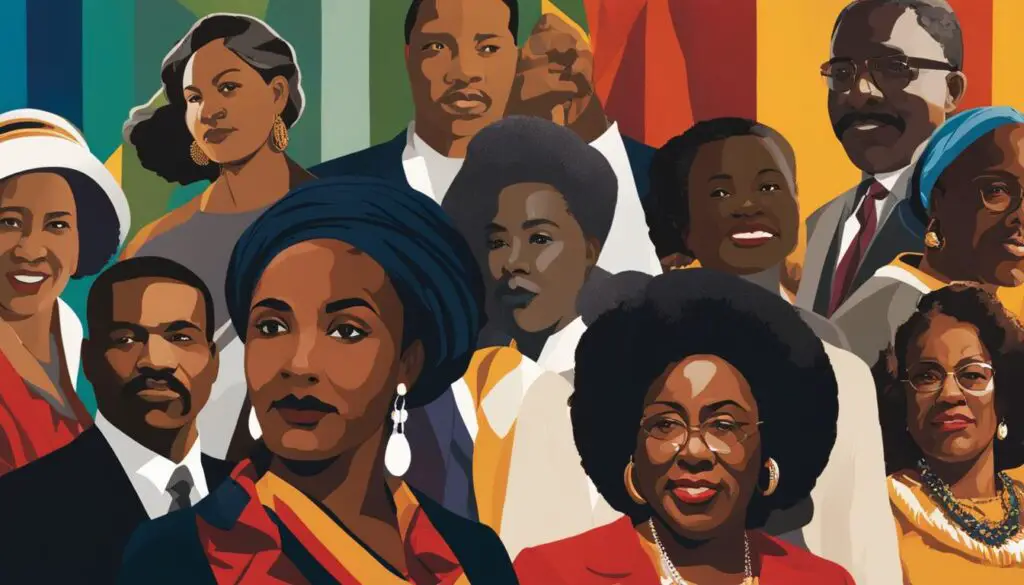Black History Month is a time for churches to honor African American heritage and deepen their faith. It is a month of celebration, reflection, and education, providing an opportunity to recognize the contributions and achievements of African Americans throughout history. Engaging in church activities during Black History Month not only fosters unity within the church community but also promotes understanding, equality, and social justice.
Throughout this article, we will explore various church activities that can be organized to celebrate Black History Month. From worship services that incorporate the rich history of African Americans to educational programs that enlighten the congregation, these activities aim to create meaningful and transformative experiences for all.
Key Takeaways:
- Black History Month is an important time for churches to honor African American heritage.
- Engaging in church activities during Black History Month fosters unity within the church community.
- Churches can incorporate the rich history of African Americans into worship services.
- Educational programs and events can educate the congregation about African American history.
- Community outreach and service projects are a meaningful way to honor Black History Month.
Celebrating Black History with Worship Services
One way to celebrate Black History Month is by incorporating the rich history of African Americans into worship services. This is a powerful way to honor the contributions and achievements of African Americans while deepening the faith of the congregation.
During worship services, churches can use hymns or songs composed by African Americans to highlight their cultural influence and musical talent. These songs not only uplift the congregation but also create a sense of connection with African American history and heritage.

Sharing stories of African American leaders within the church is another impactful way to celebrate Black History Month. Highlighting the accomplishments of pastors, missionaries, and other influential figures can inspire and motivate the congregation to continue the legacy of social justice and equality.
| Worship Service Ideas for Black History Month | Key Features |
|---|---|
| Theme: Social Justice | Focus on biblical teachings related to social justice and racial equality, incorporating prayers and readings that address these issues. |
| Hymns and Spirituals | Include hymns and spirituals composed by African Americans, showcasing the musical contributions of the African American community. |
| Spotlight on African American Leaders | Share stories or invite guest speakers to talk about influential African American leaders within the church and their contributions. |
| Community Engagement | Organize volunteer opportunities or invite local organizations that support marginalized communities to share their work during the service. |
Incorporating themes of social justice and equality in the sermon or message during worship services can also create awareness and encourage action within the congregation. By addressing the challenges faced by African Americans both historically and in the present, churches can inspire their members to actively work towards a more equitable society.
Overall, celebrating Black History Month through worship services provides an opportunity for churches to recognize and honor the significant contributions of African Americans while promoting unity and fostering a deeper understanding of the African American experience.
Understanding African American History
Churches have the opportunity to educate their congregation about African American history by organizing programs and events that celebrate the rich contributions of African Americans to various fields. These initiatives not only deepen the understanding of African American culture but also foster unity within the church community.
Guest Speakers and Workshops
Bringing in guest speakers who are experts in African American history and culture can provide valuable insights and engage the congregation in meaningful discussions. Workshops can be organized to explore important events, figures, and movements that have shaped the African American experience. By offering these educational opportunities, churches demonstrate their commitment to diversity and inclusion.
Presentations on Achievements
Churches can organize presentations that highlight the achievements of African Americans in various fields such as art, science, civil rights, and literature. These presentations can be interactive, encouraging participation and engagement from the congregation. Through showcasing the accomplishments of African Americans, churches inspire individuals to strive for excellence and overcome obstacles.
Historical Exhibits
Setting up historical exhibits within the church premises is another impactful way to educate the congregation about African American history. These exhibits can feature artifacts, photographs, and informative displays that chronicle significant events and individuals in African American history. By visually representing the struggles and triumphs of African Americans, churches encourage empathy and understanding.
| Date | Event | Description |
|---|---|---|
| February 7 | Symposium: African American Contributions to Science | Featuring renowned scientists who will discuss the groundbreaking contributions of African Americans in the field of science. Attendees will have the opportunity to engage in Q&A sessions. |
| February 14 | Art Gallery: Celebrating African American Artists | An art gallery showcasing the works of African American artists, portraying the beauty and resilience of African American culture. Local artists will be present to share the inspirations behind their artwork. |
| February 21 | Panel Discussion: The Civil Rights Movement | A panel of civil rights activists and historians will delve into the impact of the Civil Rights Movement and share personal stories of perseverance and change. The discussion will highlight the ongoing fight for equality and justice. |
Understanding African American history is crucial in creating a more inclusive and empathetic church environment. By organizing guest speakers, workshops, presentations, and historical exhibits, churches can actively celebrate black history month and promote a deeper appreciation for the contributions of African Americans.
Community Outreach and Service Projects
Engaging in community outreach and service projects is a meaningful way for churches to honor Black History Month. By actively participating in initiatives that support marginalized communities, churches can make a tangible impact and demonstrate their commitment to social justice and equality.
Promoting Unity Through Volunteering
Churches can partner with local organizations that focus on empowering African American communities. This can involve volunteering at food banks or shelters, organizing clothing or school supply drives, or participating in neighborhood clean-up projects. These initiatives not only provide much-needed resources but also foster a sense of unity and solidarity within the church community.
| Community Outreach Activities | Benefits |
|---|---|
| Volunteering at local food banks or shelters | Addresses food insecurity and homelessness |
| Organizing clothing or school supply drives | Supports underprivileged children and families |
| Participating in neighborhood clean-up projects | Enhances the aesthetic appeal and safety of the community |
Celebrating African American Culture
Churches can also organize community-wide events that celebrate the rich and vibrant culture of African Americans. This can include music concerts, art exhibitions, or talent shows featuring African American performers and artists. These events create space for cultural exchange and appreciation, while also celebrating the achievements and contributions of African Americans throughout history.
“Our church’s community-wide event celebrating African American culture was a powerful and transformative experience. It brought together people from different backgrounds, fostering a greater sense of unity and understanding. The event was a beautiful way to honor Black History Month and connect with our community.”
By engaging in community outreach and service projects, churches can actively contribute to positive change and honor the spirit of Black History Month. These initiatives not only deepen the faith of congregations but also inspire individuals to live out their faith through acts of compassion, justice, and service.

Film Screenings and Discussions
Hosting film screenings of documentaries and movies that highlight African American history and culture can spark important conversations within the church community. By showcasing films that delve into significant events and figures in African American history, churches can promote awareness, foster dialogue, and encourage deeper understanding among their members.
Following the screenings, churches can organize group discussions to provide a platform for congregants to share their thoughts, reflections, and questions. These discussions can be guided by thought-provoking questions that encourage critical thinking and facilitate meaningful conversations about the themes and messages presented in the films.
In addition to film screenings and discussions, churches can also incorporate the films’ content into sermon series during Black History Month. By dedicating a series of sermons to exploring the topics raised in the films, pastors and speakers can further engage the congregation and provide spiritual insights and guidance that connect with the African American experience.
By leveraging the power of visual storytelling through film, churches can create a dynamic and immersive experience that ignites conversations, educates, and inspires their members to actively learn and engage with African American history and culture.

Children’s Activities for Black History Month
It is vital to involve children in the celebration of Black History Month. Churches can organize activities that not only educate children about African American history but also inspire them to embrace diversity and cultivate a deeper appreciation for their own heritage. By engaging children in these activities, churches can foster a sense of unity and empower the next generation to continue the legacy of African American leaders.
One creative way to educate children about African American history is through storytelling sessions. These sessions can feature stories and folktales that highlight the struggles, triumphs, and contributions of African Americans throughout history. By hearing these stories, children can develop empathy, understanding, and a sense of pride in their heritage.
Arts and crafts workshops are another engaging activity for children during Black History Month. Churches can organize workshops where children create artwork inspired by African American culture and important figures. This hands-on approach allows children to express their creativity while learning about the significant impact of African Americans in various fields.
Additionally, research projects can be a valuable tool for teaching children about African American history. Churches can encourage children to explore and conduct research on notable African American figures, events, or movements. This not only enhances their critical thinking and research skills but also fosters a sense of curiosity and self-discovery.

Table: Recommended Children’s Activities for Black History Month
| Activity | Description |
|---|---|
| Storytelling Sessions | Engage children in captivating stories that highlight the struggles, triumphs, and contributions of African Americans throughout history. |
| Arts and Crafts Workshops | Organize hands-on workshops where children create artwork inspired by African American culture and important figures. |
| Research Projects | Encourage children to explore and conduct research on notable African American figures, events, or movements to enhance their knowledge and understanding. |
Creating Awareness Through Literature
One impactful way for churches to engage in activities during Black History Month is by setting up book clubs or reading groups that focus on literature by African American authors. By exploring the works of these authors, churches can promote dialogue, understanding, and appreciation for the African American experience within their congregation.
These book clubs and reading groups can feature a mix of classic and contemporary works, allowing participants to delve into different periods of African American history and culture. Some recommended classics include “Their Eyes Were Watching God” by Zora Neale Hurston, “Invisible Man” by Ralph Ellison, and “Beloved” by Toni Morrison. For contemporary works, “The Hate U Give” by Angie Thomas, “Between the World and Me” by Ta-Nehisi Coates, and “The Color Purple” by Alice Walker are excellent choices.
Through these literary discussions, churches can explore important themes such as racial identity, social justice, and resilience. Participants can share their insights and perspectives, fostering a deeper sense of empathy and understanding within the church community.

Benefits of Literature-Based Activities
- Facilitates meaningful discussions and dialogue
- Promotes cultural understanding and empathy
- Fosters a sense of community within the church
- Expands knowledge and appreciation for African American literature
By incorporating literature-based activities into their Black History Month programs, churches can create a space for reflection, education, and connection. These activities provide an opportunity for individuals to deepen their understanding of African American history and culture while nurturing a sense of unity within the church community.
Musical Performances and Concerts
One of the most impactful ways to celebrate Black History Month in the church community is through musical performances and concerts that showcase the rich heritage of African American music. These events not only pay homage to the contributions of African Americans to the music industry but also inspire and uplift the congregation through the power of music.
Churches can organize gospel choirs, jazz ensembles, or soul bands to perform during worship services or dedicated concerts. These musical performances can include a variety of African American music genres, such as gospel, jazz, soul, and R&B.
By incorporating these captivating performances, churches create a vibrant and energetic atmosphere that connects the congregation with the roots of African American culture. The soul-stirring rhythms and heartfelt lyrics have the power to touch the hearts of worshippers and foster a sense of unity and appreciation for the African American community.
| Benefits of Musical Performances and Concerts |
|---|
| Ambience and Spirituality |
|
| Cultural Celebration |
|
| Community Engagement |
|
Through these musical performances and concerts, churches can create a transformative and memorable experience for their members, allowing them to connect on a deeper level with the cultural heritage of African Americans. The celebration of Black History Month becomes an opportunity not only to honor the past but also to inspire and uplift the present generation.
Conclusion
Engaging in church activities for Black History Month is a powerful way for congregations to honor the contributions and achievements of African Americans while deepening their faith. By celebrating and learning about African American history and culture, churches can foster unity and create meaningful experiences for their members.
Through worship services, community outreach, and educational programs, churches can actively engage in celebrating Black History Month. Incorporating hymns and songs composed by African Americans during worship services not only adds richness to the experience but also highlights their significant contributions to the church.
Furthermore, organizing community-wide events, volunteering in marginalized communities, and hosting film screenings and discussions can spread awareness and spark important conversations about African American history and social justice. By involving children in activities such as storytelling and arts and crafts workshops, churches can ensure that the younger generation understands and appreciates the legacy of African American trailblazers.
By embracing the power of literature and music, churches can create spaces for dialogue and understanding. Book clubs and reading groups centered around works by African American authors provide opportunities for congregations to explore the African American experience, while musical performances and concerts uplift spirits and inspire congregants through the vibrant melodies of gospel, jazz, and soul.
As Black History Month approaches, let us celebrate the remarkable achievements of African Americans within the church and beyond. By engaging in these church activities, we can honor their legacy, strengthen our faith, and work towards a more inclusive and united community.
FAQ
What are some engaging church activities for Black History Month?
Engaging church activities for Black History Month can include incorporating African American history into worship services, organizing educational programs and events, participating in community outreach and service projects, hosting film screenings and discussions, facilitating children’s activities, setting up book clubs or reading groups, and organizing musical performances and concerts.
How can African American history be incorporated into worship services?
African American history can be incorporated into worship services by using hymns or songs composed by African Americans, sharing stories of African American leaders in the church, and focusing on themes of social justice and equality.
How can churches educate their congregation about African American history?
Churches can educate their congregation about African American history by inviting guest speakers, organizing workshops and presentations on the contributions of African Americans to various fields, such as art, science, civil rights, and literature.
How can churches honor Black History Month through community outreach?
Churches can honor Black History Month through community outreach by partnering with local organizations that support marginalized communities, volunteering at food banks or shelters, and organizing community-wide events that celebrate African American culture.
How can film screenings and discussions contribute to the celebration of Black History Month?
Film screenings of documentaries and movies that highlight African American history and culture can spark important conversations within the church community. Following the screenings, churches can facilitate group discussions or organize sermon series that delve deeper into the topics raised in the films.
How can children be involved in the celebration of Black History Month?
Children can be involved in the celebration of Black History Month through activities such as storytelling sessions, arts and crafts workshops, and research projects that introduce them to important figures and events in African American history.
How can literature contribute to the awareness of African American history?
Churches can set up book clubs or reading groups that focus on literature by African American authors. This can include both classic and contemporary works that explore the African American experience and promote dialogue and understanding within the church community.
How can musical performances and concerts celebrate African American culture?
Churches can organize musical performances and concerts that showcase African American music genres such as gospel, jazz, and soul. This not only celebrates African American culture but also uplifts the congregation through the power of music.
Why are church activities for Black History Month important?
Engaging in church activities for Black History Month allows congregations to honor the contributions and achievements of African Americans while deepening their faith and fostering unity within the church community.
















